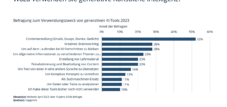Published on: April 7, 2025 / update from: April 7, 2025 - Author: Konrad Wolfenstein

AI-Emo | Artificial intelligence and emotional intelligence: The key to the German B2B success in global competition-Image: Xpert.digital
How Germany's industry can shape the B2B market with AI and Soft Skills - Germany's path to the top position: AI, innovation and relationship
Competition advantage through emotional intelligence with AI in the digital economy - the role of soft skills in technology -driven economic development
Digitization and AI development fundamentally change the economic landscape, but the successful implementation of technologies requires more than pure data-driven aptop. A paradoxical competition is created in the B2B sector, especially in the manufacturing trade: While AI tools offer efficiency gains, emotional intelligence and soft skills decide on long-term relationship strength with customers. Germany, with its historically grown industrial strength and the ability to develop high technology, keeps a unique selling point - provided that economic policy prioritizes the real economy and social partnership instead of ideological experiments.
Suitable for:
- The sales paradox-forget the Sales Funnel: The Customer Journey is dead-despite AI, Automation and CRM!
Emotional intelligence as a differentiation feature in the B2B area
Emotions also play a central role in the rational B2B environment. Decisions in complex project transactions rarely arise purely data -based, but are based on trust, security and the ability to understand individual customer needs. This dynamic is supported by AI tools, but not replaced.
The five dimensions of emotional intelligence in practice
Daniel Goleman's model of emotional intelligence - self -confidence, self -regulation, motivation, empathy, social skills - forms the foundation here. In the B2B context, these components show concrete:
- Self -confidence: the ability to assess your own strengths and weaknesses in customer contact without reacting defensively (e.g. in technical discussions with specialist departments).
- Empathy: The recognition of stress factors among customers, for example through delivery bottlenecks, and their proactive solution concepts.
- Social skills: structure of relationship networks across department boundaries, for example between engineering and purchasing.
An example of this is Salesforce that, despite leading technology platforms, focuses on personal customer advice in order to develop individual solutions. This approach shows that AI optimizes processes, but remains human interaction as a trust anchor.
AI-based emotion detection: Chance or risk?
Modern chatbots such as the KLM flight service demonstrate how AI systems capture emotional conditions of customers and adapt communicative answers. Such tools can accelerate service processes, but also mount:
- Superhumanity: Risk automated answers, to miss human nuances.
- Dependency: The reduction to technology could weaken Soft Skills in the team.
Success lies in balance: AI as an efficiency lever, emotionally intelligent employees as decision -makers.
Soft skills and AI competencies: The dual paradigm of the future
The German economy faces a double challenge: On the one hand, the demand for AI skills (104 % growth 2020–2021) increases, on the other hand, the demand for soft skills 2023 increased by 190 % compared to 2019. This "double boom" illustrates the change in the requirements.
Soft skills and AI competencies form the dual paradigm of the future
While the focus of the Hard Skills is on competencies such as data analysis, algorithm development, AI system integration and automation techniques, the soft skills are increasingly becoming more important for soft skills such as flexibility, problem-solving skills, empathy, intercultural communication, adaptability and creativity.
The role of AI in process design
AI tools such as Chatgpt or Predictive Analytics are increasingly taking on repetitive tasks-for example in order processing or warehouse logistics. This relieves specialists in order to concentrate on strategic customer relationships. A AI-based CRM system can analyze buying behavior, for example, but the interpretation and implementation into individual offers requires human judgment.
The current German dilemma: shortage of skilled workers vs. potential recruitment
The German HR landscape faces a decisive challenge: shortage of skilled workers and changed requirements through digitization and automation. Although soft skills and individual potential are becoming increasingly important, the focus of many companies remains on classic certificates and certificates. This leads to a “Mismatch of Skill” and makes it difficult to search for suitable talents.
Problems in German HR practice
1. focus on formal qualifications
Traditional selection processes rate applicants primarily according to degrees and certificates, which overlooks valuable potential. Studies show that more than half of the employees do not have the skills required for their current role, even though they appear formally qualified.
2. Automation without taking soft skills into account
The use of AI in application processes accelerates the selection, but carries risks: human aspects such as soft skills or adaptability are often not sufficiently taken into account. AI systems rate candidates based on predefined criteria, which can disadvantage unconventional talents.
3. Mismatch of skills
37 % of the German HR managers report difficulties to find talents with the desired soft skills. At the same time, less than half of the applications meet the required criteria.
Solutions
1. Skill-based recruiting
A competence-based approach (skill-based hiring) focuses on skills instead of formal qualifications. This enables a future -oriented assessment of applicants and takes into account their potential for further development.
2. Career grilles instead of career ladder
Flexible career paths allow employees to use their strengths in a targeted manner and to develop new skills. The concept of the career feast promotes laterally or diagonal career steps and increases employee satisfaction.
3. 9-box grid for potential assessment
The 9-box GRID model helps companies to systematically evaluate the performance and potential of their employees. It supports targeted talent promotion and succession planning.
4. Soft skills training
Training programs for soft skills such as communication, adaptability or conflict resolution are essential to prepare employees for the requirements of the modern working world.
How AI and automation can significantly improve recruiting when used correctly
The German HR landscape has to focus more on individual skills and potential in order to counteract the shortage of skilled workers and effectively promote talents. Automation and AI offer opportunities for increasing efficiency, but must not lose a view of human qualities. A rethink towards flexible career paths and skill-based recruiting is necessary to remain competitive in the long term.
Germany vs. USA: Industrial strength vs. tech dominance
While the United States conducted undisputed ("Magnificent Seven") in the tech sector, there is a clear gradient in the industrial sector. The German mechanical engineering industry benefits from US cleaning industrialization because it delivers key technologies that are not sufficiently available in the United States.
Suitable for:
German industry as a US partnership
The German-American partnership in the field of industry has developed considerably. German exports to the United States, especially industrial equipment, have increased strongly and reflect the importance of high technology and the “Made in Germany” quality seal.
Current figures on German industrial exports in the USA
- Total value of exports: In 2024, German exports to the USA was $ 116.33 billion, which makes the USA the largest trading partner in Germany.
- Machines and equipment: Machine exports achieved a value of $ 22.54 billion in 2024, which makes the United States the largest market for German machines.
German industry remains a leader in precision machines and automation solutions. The trend towards Industry 4.0 and process automation is promoted by technologies such as AI, IoT and Edge computing, which increases efficiency and sustainability.
The “Made in Germany” label continues to stand for reliability and innovation worldwide. It enjoys high trust among consumers and companies and contributes significantly to export success.
Suitable for:
Political recommendations for action for a strong B2B economy
In order to secure the German position, political framework conditions must support the combination of technology and human skills.
1. Promotion of the social partnership
The German social market economy offers a unique ecosystem for innovation. The return to this model requires:
- Stable framework: reduction of regulatory hurdles for SMEs.
- Training initiatives: Cooperations between industry and educational institutions.
2. Research funding with a focus on key technologies
The USA is investing massively in AI and semiconductors. Germany must create counterweights:
- Funding programs for Industry 4.0: Integration of AI in production processes.
- Specialist offensive: increase in attractiveness for MINT professions.
3. Strengthen international collaborations
Global competition requires strategic alliances. A transatlantic tech pact could create synergies:
- US technology + German industry: joint developments in AI-based production.
- Trade agreement: stabilizing the supply chains.
Suitable for:
Man at the center of the digital transformation
The future of the B2B area does not depend on whether AI dominates, but how it is used. Companies that use AI as an increase in efficiency and at the same time promote emotional intelligence will exist in the long term. For Germany this means:
- Technological excellence: secure the management position in mechanical engineering.
- Human Skills: Investment in Soft Skills and Intercultural Skills.
- Political stability: return to the social market economy as a model of success.
The way there requires courage to make a decision - not to ideology. German industry is on the threshold to use the combination of AI and human intelligence to the global top position. The question is whether politics understand this as an opportunity.
Suitable for:
Your global marketing and business development partner
☑️ Our business language is English or German
☑️ NEW: Correspondence in your national language!
I would be happy to serve you and my team as a personal advisor.
You can contact me by filling out the contact form or simply call me on +49 89 89 674 804 (Munich) . My email address is: wolfenstein ∂ xpert.digital
I'm looking forward to our joint project.















